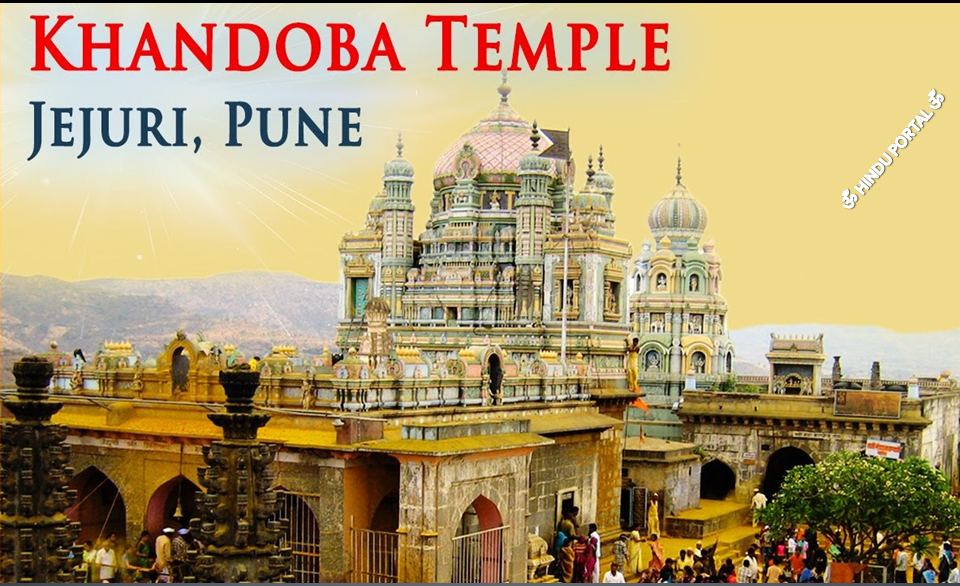Jejuri is one the most popular pilgrim centre in Maharashtra,India located 47-km from Pune. Jejuri temple dedicated to Lord Khandoba.
Jejuri, popularly known as Khandobachi Jejuri, is one of the vital Gods worshipped by Dhangar community, the oldest tribes in Maharashtra, Karnataka & Andhra Pradesh [ Present Telangana ]
Khandoba, in the form of two Swayambhu (self created) Lingas is a god of Sakamabhakti i.e. it God who fulfills all the wishes of his devotees. Jejuri is also popular for its old Deep Mala.
Khandoba is the family deity (Kul Devata) in Maharashtra, the patron deity of Deshastha Brahmin, farming and herding castes, warrior, the hunters and gatherers of the hills and forests.
The religious group of Khandoba has also linkages with Jain and Vaishnava ethnicity, and also assimilates all communities irrespective of caste, including Muslims also.
The deity of Khandoba in the temple is very beautiful. Various weapons like Sword, Damaru and Paral are of historic commemoration. As this temple is on the hill, visitors have to climb almost 200 steps. But the climbing is not so hard and one can see the wonderful view of Jejuri town which is marvelous.
The Sword handling competition which held on “Dasera” is very popular among the devotees, as one has to lift the sword in high for a maximum time.
The other idols of Khandoba, Mhalsa and Manimalla are also good-looking. Jejuri is having historically important place as Shivaji meet here his father Shahaji after a long period. The meeting is historically very important as both discussed the strategies against Mughals, here. That time, Jejuri was one of the main hill forts in South region.
“Kandobacha Yelkot” “Jay Malhar” is some of the popular slogans here. One can find many sculptures in and around the Jejuri temple area.
Jejuri has also been a historically important place as Shivaaji met his father Shahaji here after a long period. The meeting is historically very important as both discussed the strategies against Mughals.
By: +Prof: Koti Madhav Balu Chowdary
Jejuri, popularly known as Khandobachi Jejuri, is one of the vital Gods worshipped by Dhangar community, the oldest tribes in Maharashtra, Karnataka & Andhra Pradesh [ Present Telangana ]
Khandoba, in the form of two Swayambhu (self created) Lingas is a god of Sakamabhakti i.e. it God who fulfills all the wishes of his devotees. Jejuri is also popular for its old Deep Mala.
Khandoba is the family deity (Kul Devata) in Maharashtra, the patron deity of Deshastha Brahmin, farming and herding castes, warrior, the hunters and gatherers of the hills and forests.
The religious group of Khandoba has also linkages with Jain and Vaishnava ethnicity, and also assimilates all communities irrespective of caste, including Muslims also.
Khandoba is popular as Mallanna in Andhra Pradesh [ Present Telangana ] and Mailara in Karnataka. Khandoba, also famous as Khanderao, Khanderaya, Malhari Martand and Mallu Khan is a regional Hindu God, worshipped as Martanda Bhairava, a form of Mahadev JEJURI is also known as golden city.(Follow The Hindu Portal on Facebook; and Twitter @Spiritualvoices)
The deity of Khandoba in the temple is very beautiful. Various weapons like Sword, Damaru and Paral are of historic commemoration. As this temple is on the hill, visitors have to climb almost 200 steps. But the climbing is not so hard and one can see the wonderful view of Jejuri town which is marvelous.
The Sword handling competition which held on “Dasera” is very popular among the devotees, as one has to lift the sword in high for a maximum time.
The other idols of Khandoba, Mhalsa and Manimalla are also good-looking. Jejuri is having historically important place as Shivaji meet here his father Shahaji after a long period. The meeting is historically very important as both discussed the strategies against Mughals, here. That time, Jejuri was one of the main hill forts in South region.
“Kandobacha Yelkot” “Jay Malhar” is some of the popular slogans here. One can find many sculptures in and around the Jejuri temple area.
Jejuri has also been a historically important place as Shivaaji met his father Shahaji here after a long period. The meeting is historically very important as both discussed the strategies against Mughals.
By: +Prof: Koti Madhav Balu Chowdary












